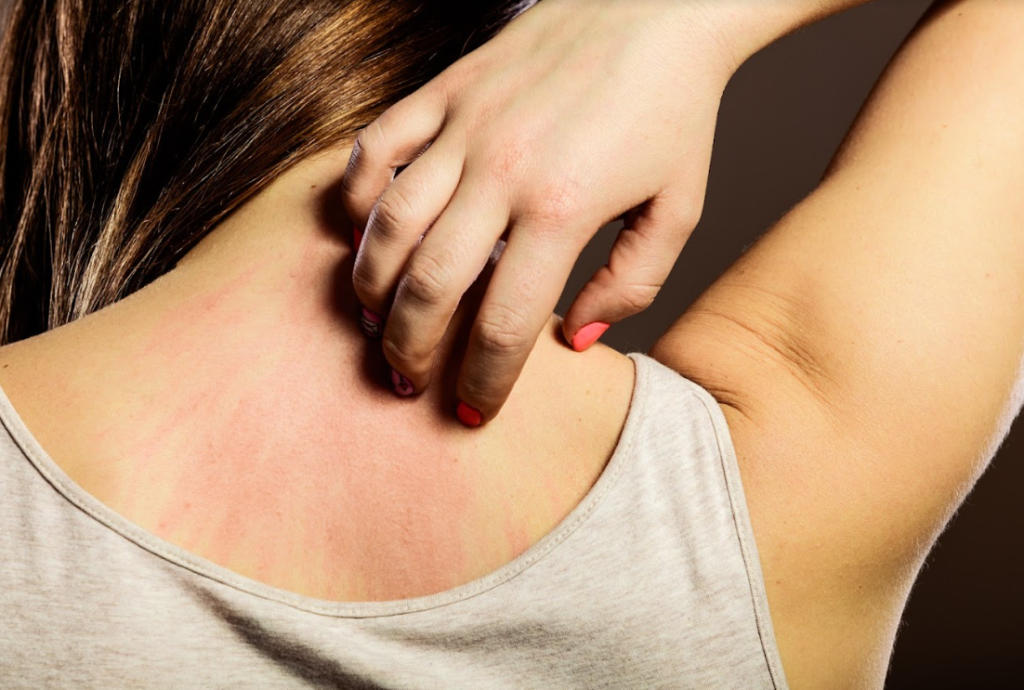Itchy skin, medically known as pruritus, can be a nuisance for many. This irritating sensation may make you want to scratch yourself uncontrollably, hindering you from performing your daily tasks. The skin irritation may come as a few inflamed bumps or a patch of blisters. These rashes can be uncomfortable and could worsen if not treated immediately. (2)(5)
There are several possible causes of itchy skin. Some are easily visible, while others aren’t, so you’ll need to check with a doctor. Knowing the underlying cause of an itch is the first step to finding treatment. Here’s a list of reasons for itchy skin and what to do:
Skin conditions
Common skin conditions like dermatitis, psoriasis, and eczema are notorious for causing uncomfortable rashes. Infections such as insect bites, chickenpox, and measles may also trigger severe itching. Some conditions heal over a short period, while others may take longer and may require frequent treatment. Hence, it’s best to visit your doctor to know what makes you itch and what steps to take. (2)(3)(4)
Many dermatologists may suggest generic over-the-counter (OTC) ointment or prescribe a specific treatment, depending on your condition. A topical steroid-free cream like Dermeleve may be enough to relieve the itch. While treatments with steroids could temporarily calm inflamed skin, they don’t always work for specific issues like shingles. Ointments with moisturizing properties may also soothe itchy skin, especially when it’s dry. (2)(3)
Oral medications could alleviate the itching sensation from inside your body. Sometimes, however, phototherapy or light therapy needs to be done for those unable to consume oral medication. Another method to ease the discomfort is to take a warm bath or shower. A wet washcloth and an ice pack over the affected area will also keep you from scratching it all the time. (1)(5)
Allergens
Contaminants in the air, animals, or plants may come into contact with the skin, which then cause a rash. An allergy to something might be the reason for your itchiness. If this is the case, you must find out the allergen as soon as possible. (2)
Aside from pollen, pet dander, and dust, other common allergens include:
- Wool
- Nickel
- Food and fragrances
- Latex
- Chemical dyes
- Certain medications
- Poison oak or ivy (2)(3)
Sun exposure and saltwater may also cause skin irritation in some individuals. Extreme temperatures could also be the culprit. In cases like these, applying sunscreen and unscented moisturizers may prevent a rash from appearing and soothe inflammation. (5)
Fortunately, as recommended by your doctor, most topical or oral treatments can relieve the rash caused by these allergens. Over-the-counter antihistamines are usually the prescribed medication for mild skin allergies, and you can buy these in most drugstores. (3)(4)
Most hospitals and dermatology clinics should have a particular test for determining what triggers a person’s allergies. This test could come as a blood sample or a patch test. Discovering the allergen will help you avoid it in the future, saving you the worry of getting a bothersome itch. (1)(3)
Internal diseases
One of the lesser-known reasons for skin irritations is an internal issue. A failing organ may manifest externally as itchy patches on your skin. Those with preexisting illnesses, such as leukemia and HIV are also most susceptible to pruritus. (2)(5)
Your physician may have you take X-rays or tests on the liver, kidney, or thyroid to see if the cause is internal. You could take an antidepressant, such as sertraline or fluoxetine, to target the internal cause of the itch, which may come from liver disease. If you have a preexisting or chronic illness, schedule a checkup with your physician to see if it might be the reason for your itchy skin. (1)(2)

Neurological conditions
Nerve disease is another cause of pruritus. Diabetes and shingles are the most common nervous system issues that could elicit rashes and itchy patches of skin. Severe conditions like stroke and multiple sclerosis may also cause constant itches. (2)(3)(4)
Getting an accurate diagnosis is crucial to determining what the actual cause is. Your physician will prescribe medication to treat your condition, and a dermatologist could suggest treatment for your itchy skin. If you’re communicating with more than one medical professional, always ensure that it’s safe to take your different medicines simultaneously. (3)
Psychological issues
Sometimes, the cause of pruritus is purely psychological, with no internal or external stimuli. Poor mental health may have a person thinking that there’s something constantly irritating their skin, which they scratch in response. Compulsive scratching is one of anxiety and obsessive-compulsive disorder’s (OCD) symptoms. (4)
Proper counseling and therapy could reduce feelings of stress and anxiety, decreasing the chances of you scratching yourself for no reason. Practicing yoga and meditation may also relieve actual skin inflammation while helping you become more relaxed. (1)(2)
Conclusion
Itchy skin shouldn’t impede your life. Causes of skin irritation may vary, and you’ll easily find the reason for it by visiting your doctor or dermatologist. They’ll recommend the most effective treatment for you, depending on the severity of your condition.
Even with prescribed medicine, you can still use home remedies like lotions and moisturizers, taking a bath, or using a humidifier. These methods, paired with professional treatment, may relieve you of your itchiness momentarily or for a lifetime. (1)
References
- “Itchy skin (pruritus)”, Source: https://www.mayoclinic.org/diseases-conditions/itchy-skin/diagnosis-treatment/drc-20355010
- “What’s Causing Your Itchy Skin? (with Pictures)”, Source: https://www.healthline.com/health/itching
- “10 Reasons Your Skin Itches Uncontrollably and How to Get Relief”, Source: https://www.aad.org/public/everyday-care/itchy-skin/itch-relief/relieve-uncontrollably-itchy-skin
- “Why is my skin itchy?”, Source: https://www.medicalnewstoday.com/articles/311473
- “Your Skin, Pruritus, and Itching”, Source: https://www.webmd.com/skin-problems-and-treatments/guide/skin-conditions-pruritus


